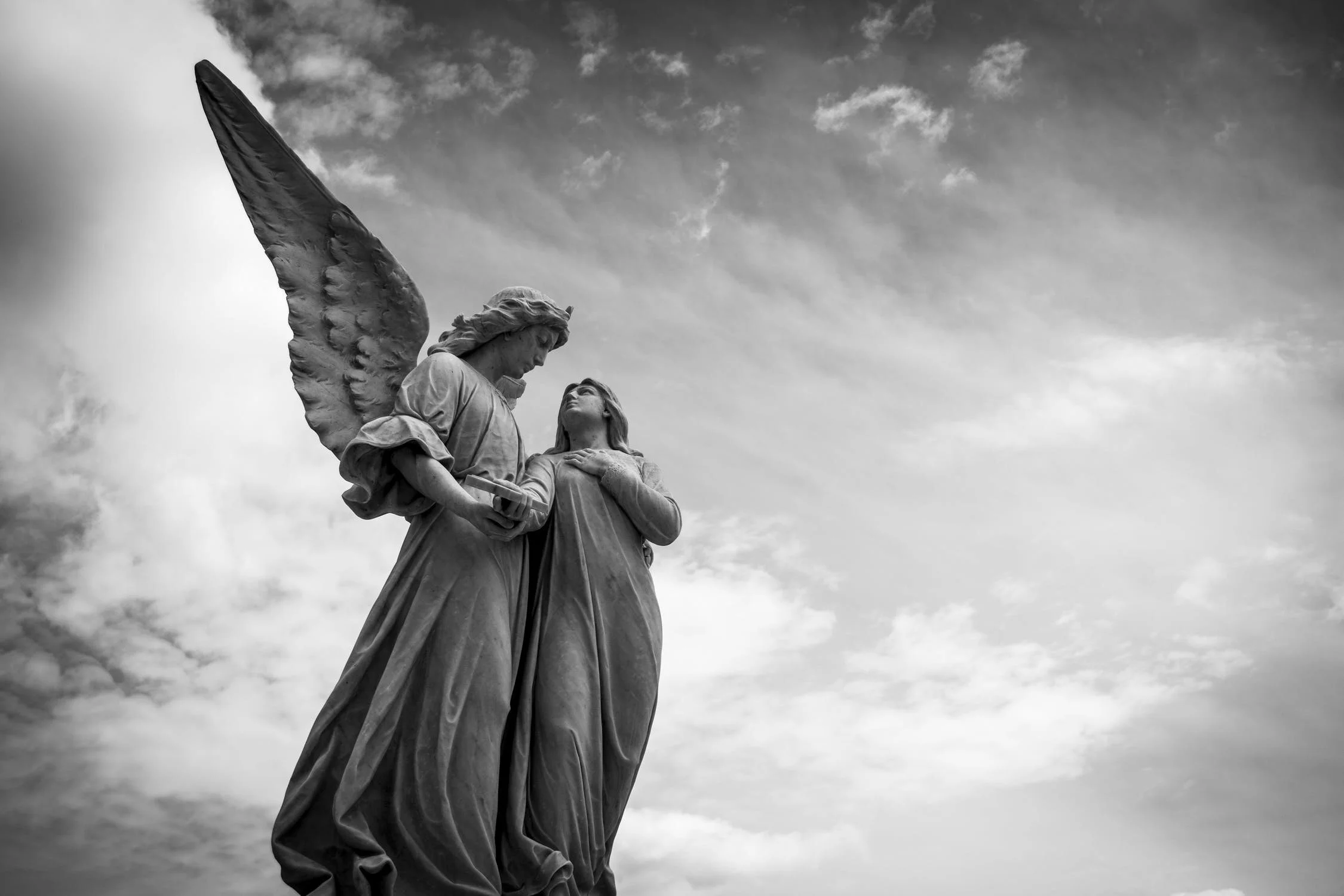What Are Angels?
The final group of beings we want to talk about are angels and demons. Below you'll find biblical descriptions of angels, fallen angels, and even demons. We hope this blesses you!
What are angels?
Angels were created holy (Col. 1:16; Jude 6). They are personal with intellect (1 Pet. 1:12), will (Jude 6), and emotion (Luke 2:13). By nature they are spirit (Heb. 1:14), immortal (Luke 20:36), distinct from human beings (Heb. 2:7), and powerful (2 Pet. 2:11), but inferior to Christ (Heb. 1:4). Their major purposes are to praise God (Isa. 6:3; Rev. 5:9), serve as His messengers and servants (Luke 1:26-38; Acts 10:3-7; 12:7-10) and to minister to believers (2 Kings 6:17; Psa. 34:7; Heb. 1:14).
Satan is an angel (Eph. 6:11-12) created by God who fell through pride (1 Tim. 3:6). He is the tempter (Gen. 3:1-7; 1 Thess. 3:5), prince of this world (John 12:31), god of this age (2 Cor. 4:4), accuser of the saints (Rev. 12:10). He is leader of an army of evil spirits or demons (Matt. 12:24). Their purpose is to thwart the work of God (Rev. 16:13-16). They can inflict diseases (Matt. 9:33), oppose spiritual growth (Eph. 6:12), spread false doctrine (1 Tim. 4:1), and possess humans (Matt. 4:24). Believers are never under satanic authority (Acts 26:18; Col. 1:13). Demons try to deceive, accuse and tempt believers who may yield to their influence (Jas. 4:7; 1 Pet. 5:8). They can be resisted by the believer who uses the armor of God (Eph. 6:11-18). Their destiny is eternal damnation in the lake of fire (Rev. 20:10).
Angels vs. Fallen Angels
Angels
Angels are personal, spiritual beings (Heb. 1:14), created by God (Ps. 148:1-6; John l:l-3), before the formation of the world (Job 38:7) in holiness (Gen. 1:31), and for the sake of His own glory (Col 1:16). Following their creation, they were given the choice between obedience and disobedience to God. The holy angels, those who did not sin, were forever confirmed in their holiness (Mark 8:38; 1 Tim. 5:21). The demons, those angels who fell, were forever confirmed in their evil (Matt. 25:41; Luke 11:24-26). No angels are given the offer of salvation (Heb. 2:16; 1 Pet. 1:12).
Angels are a distinct order of creation, higher than man, but not to be worshiped (Heb. 2:7; Col. 2:18). They are great in might and power (2 Pet. 2:11) and not subject to death (Luke 20:36). They are beings of intelligence (1 Pet. 1:12), emotions (Job 38:7; Luke 15:10), and will (Isa. 14:12-15). They are vast in their number (Heb. 12:22) and exist in angelic orders (Ps. 89:5-7; Eph. 3:10; 6:12). At times they have appeared to people in bodily form (Gen. 18:1-8; Heb. 13:2).
Angels exist to serve God and to work in relation to His purposes (Ps. 103:20; Heb. 1:7). They are created to offer praise and worship God (Isa. 6:3; Rev. 5:11-13). They are ministering agents, encouraging and delivering the people of God (1 Kgs 19:5-6; 2 Kgs 5:15-17; Heb. 1:14), acting as His messengers (Matt. 1:20), observing the world governments (Dan. 4:13,17) and executing His judgments (Gen. 19:1, 13; 2 Thess. 1:7-8).
Satan and Fallen Angels
I believe that Satan was divinely created as a perfect angel (Ezek. 28:13-16), but as a result of his pride and desire to be like the infinite God, sin entered into the universe (Isa. 14:12-15; Ezek. 28:13-16). He was cast out of heaven with those angels who followed him (Rev. 12:3-4) and is now the open and declared enemy of God and man (Matt. 13:37-39; 1 Pet. 5:8). He is the ruler of the demonic world and the present evil world system (Matt. 12:26; 2 Cor. 4:4; Eph. 6:11-12). He is called the Devil, the dragon, the deceiver of the whole world (Rev. 12:7-9), the Adversary (1 Pet. 5:8), the tempter (Matt. 4:3), the Evil one (John 17:15), the god of this age (2 Cor. 4:4), and the father of lies (John 8:44).His purpose is to blind unbelievers to the gospel (2 Cor. 4:4), and to hinder the service of Christians (1 Thess. 2:18), seeking even to destroy them (1 Pet. 5:8). He has been defeated through the death and resurrection of Jesus Christ and now stands under condemnation (John 12:30-32; 16:11; Col. 2:15). His final dwelling place for all of eternity will be the lake of fire (Matt. 25:41; Rev. 20:10).
Demons are fallen angels who followed in Satan's rebellion against God (Matt. 12:24; 2 Pet. 2:4). Some are active in promoting Satan's program of opposition (Eph. 6:11-12), while others are now confined (Jude 6). They are called demons or unclean spirits (Luke 8:29), the Devil's angels (Matt. 25:41), evil spirits (Luke 7:21), and spiritual forces of wickedness (Eph. 6:12). They seek to thwart the purpose of God (Rev. 12:7), inflicting physical suffering (Luke 13:11-16), possessing unbelievers (Matt. 9:32-33; 1 John 5:18), and promoting false doctrines (1 Tim. 4:1).
Angels vs. Demons
Angels
Angels are personal, spiritual beings (Heb. 1:14) created by God (Neh. 9:6) for his glory (Col. 1:16). They are powerful (Ps. 103:20), intelligent (2 Sam. 14:20), immortal (Luke 20:36), moral (2 Pt. 2:4), and finite (Luke 1:26). They are glorious beings (Luke. 9:26) but should not be worshiped (Rev. 19:10). Though they are ordinarily invisible (2 Kings 6:17) they can appear in bodily form (Matt. 28:5). Created as holy beings (Gen. 1:31), some sinned and rebelled against God (2 Pet. 2:4) and God condemned them to be bound in hell (2 Pet. 2:4; Jude 6).
Angels worship God (Heb. 12:22), act as his messengers (Luke. 1:11-19), battle demonic powers (Dan. 10:13), and carry out some of God's judgments (Rev. 8:1-9:21). They guard, protect, and minister to God's people (2 Kings 6:17; Heb. 1:14). They ministered to Jesus at his temptation and crucifixion (Matt. 4:11; Luke. 22:43) and will accompany him at the Second Coming (Matt. 16:27).
Demons
Demons are spiritual beings (Matt. 8:16) who are opposed to God's work (2 Cor. 4:4; Gal. 4:8). Though the Bible is does not speak explicitly on the subject, they may be a category of fallen angels who are not bound in hell (Matt. 25:41; Gal. 1:8). They know the truth about God and Jesus (Luke 4:41; Jas. 2:19) but they seek to hinder God's plan by controlling (Matt. 8:16), hurting (Luke 13:11-16), and deceiving people (1 Tim. 4:1; Rev. 12:9) often pretending to be gods (Deut. 32:17; 1 Cor. 10:20). Though they are powerful (Luke 8:29) they are limited by God's control (Job 1:12). Satan, the ruler of the demons (Matt. 12:24) and of this world, (Jn. 12:31) seems to have been the originator of sin (Gen. 3:1 and is actively involved in accusing God's people (Zech. 3:1), tempting them (Mk. 1:13; 1 Cor. 7:5), seeking to hinder their ministry (2 Thess. 2:18) and destroy them (1 Pet. 5:8).
God triumphed over Satan and his demons through the redemptive work of Jesus (Col. 2:13-15) and that all Christians have been delivered from the dominion of Satan into the kingdom of Jesus (Col. 1:13-14). Christians are therefore no longer under the authority of Satan or his demons (Col. 2:9-15) although they can still be influenced by them (Matt. 16:22-23; Acts 5:3). Christians are called to avoid having anything to do with demons (1 Cor. 10:20-21) and to resist Satan (Jas. 4:7) by faithfully applying the fundamentals of the faith (Eph. 6:10-20; Rom. 12:1-2) and holding fast to the truth (John. 8:32).





